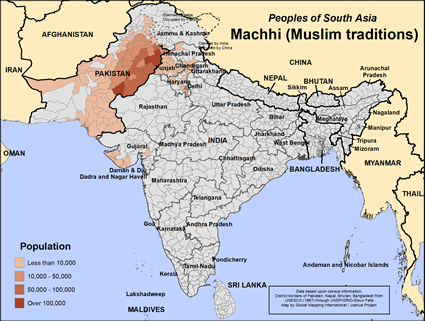Machhi (Muslim traditions) in Pakistan

Photo Source:
Copyrighted © 2026
Yousuf Manjothi - Shutterstock All rights reserved. Used with permission |

Map Source:
People Group data: Omid. Map geography: UNESCO / GMI. Map Design: Joshua Project.
|
| People Name: | Machhi (Muslim traditions) |
| Country: | Pakistan |
| 10/40 Window: | Yes |
| Population: | 2,462,000 |
| World Population: | 2,486,000 |
| Primary Language: | Punjabi, Western |
| Primary Religion: | Islam |
| Christian Adherents: | 0.00 % |
| Evangelicals: | 0.00 % |
| Scripture: | New Testament |
| Ministry Resources: | Yes |
| Jesus Film: | Yes |
| Audio Recordings: | Yes |
| People Cluster: | South Asia Muslim - other |
| Affinity Bloc: | South Asian Peoples |
| Progress Level: |
|
Introduction / History
The Macchi people, primarily known for their fishing practices, have long inhabited the coastal regions of Pakistan. Their history stretches back centuries, with their ancestors relying on the abundant marine resources of the Arabian Sea. Over time, the Macchi established themselves as skilled fishermen and traders, playing a vital role in the local economy. Their deep connection to the sea and their traditional knowledge of fishing techniques have been passed down through generations. Today, the Macchi people continue to live along the coastal areas of Sindh and Balochistan.
What Are Their Lives Like?
Fishing remains their primary occupation, with many Macchi families operating small boats and engaging in artisanal fishing. They also work in related industries such as fish processing and trading. Life in Macchi communities revolves around the rhythms of the sea, with daily activities dictated by tides and weather conditions. Despite facing economic hardships and environmental challenges, the Macchi people enjoy local festivals and celebrations. The Macchi community holds an oral tradition, with stories and folklore that celebrate their maritime heritage and the wisdom of their ancestors.
Their belief system emphasizes the importance of family, community, and respect for nature, reflecting their connection to the sea.
What Are Their Beliefs?
The Macchi people practice Sunni Islam. They observe Islamic rituals and traditions, including daily prayers, fasting during Ramadan, and celebrating religious festivals. Being a South Asian people, they include Hindu-like practices that taint their form of Islam.
What Are Their Needs?
The Macchi people face several critical needs that require attention to improve their quality of life. Access to education is essential, as many children in coastal areas lack schooling opportunities. Improved healthcare services are crucial, given the limited availability of medical facilities and high rates of health issues related to their occupation. Economic support through sustainable fishing practices, market access and alternative livelihoods can enhance their resilience. Infrastructure development, including better roads, clean water supply, and electricity, will also benefit the Macchi community. Addressing these needs will enable the Macchi people to achieve greater socio-economic stability.
Prayer Points
Pray for the Macchi people to seek and find the blessings of Christ and share them with others.
Pray for their family leaders to have dreams and visions of the risen and victorious Christ.
Pray for loving and dedicated workers to take the gospel to them.
Pray for the Macchi people to have the spiritual courage it takes to embrace the Lord despite public interference.